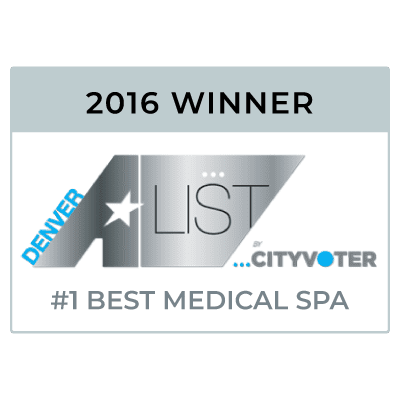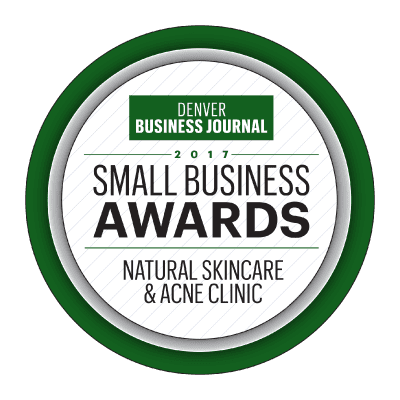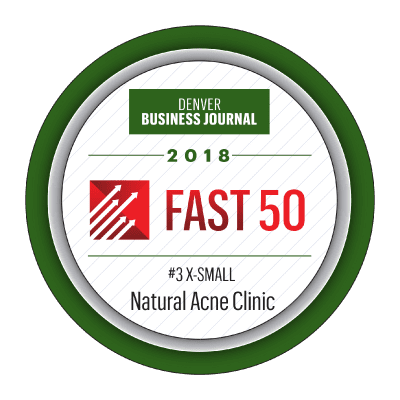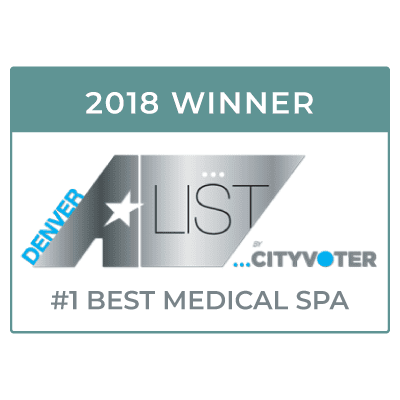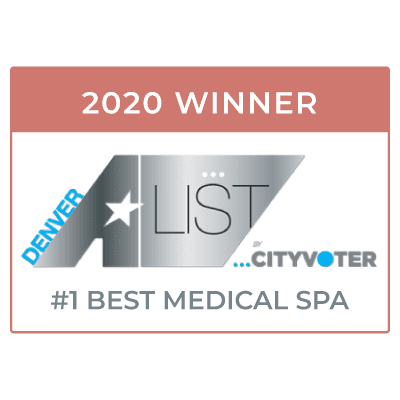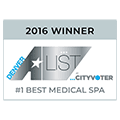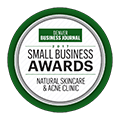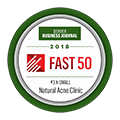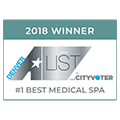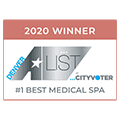While there is no golden rule for getting clear, we have put together a list of the key things that DO matter when trying to get clear and may have an impact on your skin.
1. Avoid cosmetics, hair care, and skincare products with PORE-CLOGGING INGREDIENTS
Knowing what ingredients are safe for acne-prone skin is very important. There are many ingredients used in acne products (over-the-counter and prescription) that are comedogenic, or pore-clogging.
For example, Retin-A from your Dermatologist contains isopropyl myristate as its first ingredient, which is a 5 out of 5 on a pore-clogging scale. You can view a list here of pore-clogging ingredients.
Unfortunately, there is no truth in advertising…products labeled as “non-comedogenic”, non-pore clogging, oil-free, kills bacteria, etc- there may be no truth in these claims, yet the FDA allows them to make false claims.
Basically, acne sufferers are allergic to these pore-clogging ingredients. But don’t worry, we are here to educate you on what ingredients to stay away from and how to read labels properly.
2. Get Plenty of Rest and Reduce Stress as much as you can
Stress can stimulate acne in anyone that is acne-prone. Because stress aggravates the adrenal glands, which are responsible for producing the androgen (testosterone) hormones in men and women, too much stress could cause the body to produce excessive oil production which leads to clogged pores.
3. Omit Foods, Supplements, and Sports Drinks that contain Iodides
Seafood, shellfish, seaweed, iodized salt (sea salt is fine), fast food, and dairy products all contain high amounts of iodized salt. Supplements for thyroid support, such as iodine and kelp are also contraindicated if you are acne-prone. It is mostly a myth that chocolate and “greasy foods” cause acne unless they are high in salt.
4. Stay Away from “High Androgen” Foods
High androgen/testosterone foods boost testosterone levels in men and women. Foods that boost testosterone levels include beef, cow’s milk, whey protein, peanut butter, pork, organ meats, corn oil, shellfish, tuna, egg yolks, and refined sugars.
A study conducted at the University of Helsinki in Finland and published in the “Journal of Clinical Nutrition” found that a higher intake of protein and fats were associated with higher levels of androgens (testosterone). Vegetarians had lower levels of male hormones than meat-eaters. High intake of plant foods, particularly fiber-rich whole grains, appeared to lower levels.
5. Beware of swimming pools disinfectants
Some swimming pool disinfectants contain iodides and chlorine. These chemicals stay in the pool for long periods of time and then absorb into the skin. Regular swimmers find that the combination of physical exercise, heat and humidity, and the chlorine in the pools can cause major acne flare-ups.
6. Don’t Pick
Picking can cause unwanted scarring and hyperpigmentation. I often see clients trying to pick a breakout that is not able to be picked such as a nodule or cyst. Instead, as soon as you feel or see an inflamed breakout coming on, ice the area to calm the inflammation and also apply Face Reality Acne Med (benzyl peroxide). These two steps will minimize the damage and impact of a pimple.
7. Use Fragrance-Free and Sodium Lauryl Sulfate free laundry detergents
Conventional laundry products such as detergents and dryer sheets often contain toxic chemicals such as sodium lauryl or laureth sulfate and fragrance. Laundry care manufacturers are not required to list ALL the ingredients that are used in their products …the term “fragrance” alone may refer to a combination of several hundred laundry chemicals that may be toxic or hazardous. Have you noticed that your laundry detergent contains a warning label!
Not only are most laundry products toxic, but they are also pore-clogging. Fabric softener sheets specifically contain a waxy residue that is left behind on the fabric and is then transferred over to the face and body. This residue is very pore-clogging. Sodium lauryl sulfate, the main ingredient in detergent, is also pore-clogging.
If you are acne-prone, it is especially important that clothing, bath towels, bed sheets, blankets, and pillow cases are not washed with brands such as Tide, Purex, Gain, Arm & Hammer, and All.
While “free” and “sensitive” versions of the above are better for acne, I also find it important to mention that these products are highly toxic. For example, the Environmental Working Group has given Arm & Hammer Free a D rating and is of moderate concern to be cancer-causing. You can learn more at www.ewg.org
I personally switched to a toxin/chemical-free home with the Melaleuca laundry and other household cleaning items and am so excited to be chemical-free! Not to mention saving money.
8. Avoid Low Dose Birth Control Pills
Contrary to what you may hear from commercials and your OBGYN, birth control pills do not always cure acne. Rather, some pills can cause acne or make it worse. Any pill that is low dose or devices such as the implant, Mirena IUD (Paragard is ok since it does not have any hormones), NuvaRing, and injections all have low amounts of estrogen and high amounts of androgens (a form of testosterone). High androgens promote oily production and breakouts.
Progesterone hormone replacement pills such as Premarin may also cause acne.
See our guide here of what birth control pills acne sufferers should avoid or are safe.
9. Avoid “Hair, Skin, and Nails” or Biotin Supplements
Hair, Skin and Nails supplements typically contain Biotin, or B7, as the main ingredient. Biotin is a supplement that will help the hair grow faster and thicker, nails grow stronger, and skin to be healthier and shinier. Biotin is vital to cell proliferation, which is why it is a valuable tool in hair growth. When ingested, biotin reacts with cell enzymes and plays a vital part in producing amino acids, which are the building blocks of protein. This is bad for acne because acne is a condition of the cells already turning over too quickly!
Beware that you should not take Biotin, B7 or a Hair, Skin, and Nails supplement if you are suffering from acne.
Vitamin A for acne acts to slow down cellular turnover and is a fantastic supplement for acne. Learn more about Clove Hill Skin Clarity– the proper type of skin supplement.
10. Limit sun exposure and use a non-pore-clogging sunscreen
Sun can make hyperpigmentation worse and can exacerbate acne for most with frequent exposure. Sunscreens and blocks can be one of the worst offenders of pore-clogging ingredients. The Clove Hill Tinted and Non-tinted Chemical-Free Sunscreens are non-pore clogging and feel amazing on the skin.
Finally, don’t forget that we offer a Skin Analysis & Personalized Solution, where one of our Clear Skin Coaches will walk you through more information than you’d ever imagine is possible and most importantly, will get you educated about your skin and how to get clear.
